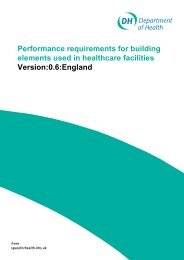Early Life Nutrition and Lifelong Health - Derbyshire Local Medical ...
Early Life Nutrition and Lifelong Health - Derbyshire Local Medical ...
Early Life Nutrition and Lifelong Health - Derbyshire Local Medical ...
Create successful ePaper yourself
Turn your PDF publications into a flip-book with our unique Google optimized e-Paper software.
BMA Board of ScienceOther outcomes: bone health, coeliac disease, inflammatory bowel diseaseBreastfed infants, consistent with their smaller size, have lower bone mineral content (BMC) thanformula-fed infants. The calcium <strong>and</strong> phosphate content of formula has been shown to influenceBMC during infancy in r<strong>and</strong>omised intervention studies. 209 There are, however, no data on longtermoutcomes such as adult bone density or fracture risk.A systematic review found consistent evidence from six case-control studies that longer duration ofbreastfeeding, <strong>and</strong> breastfeeding at the time of introduction of gluten containing foods, protectedagainst the later development of coeliac disease. 210 There is inconclusive evidence of protectionagainst inflammatory bowel disease. 194Other aspects of infant diet <strong>and</strong> long-term outcomesThere are very few studies relating long-term outcomes to other aspects of infant diet, for exampleeffects of different formulas, the age at which solids were started, the type <strong>and</strong> quality ofcomplementary feeds, <strong>and</strong> the use of micronutrient supplements.Lucas <strong>and</strong> Singhal have followed up children who took part in a series of r<strong>and</strong>omised trials ofdifferent formula feeds as babies born pre-term or SGA. 202, 211-213 Among pre-terms those whoreceived banked breast milk had the lowest blood pressures <strong>and</strong> 32-33 split proinsulinconcentrations (an indicator of insulin resistance) at 13-16 years. Those fed enriched pre-termformula had the highest, <strong>and</strong> those fed st<strong>and</strong>ard formula had intermediate levels. Term SGA babiesfed st<strong>and</strong>ard formula had lower diastolic blood pressures at six to eight years than those fedenriched formula.The macronutrient balance of the infant diet may be important. Higher protein intakes in lateinfancy have been associated with greater adiposity in childhood. 193, 214 Another study suggestedthat animal protein (especially dairy protein), but not vegetable protein, was linked to lateradiposity. 215 The INCAP trial in Guatemala, r<strong>and</strong>omised villages to receive one of two supplementsfor mothers <strong>and</strong> children: high-protein, high-energy drink (protein 6.4 g/100ml, energy 900 kcal/l)or a lower nutrient drink (energy 330 kcal/l, no protein). Both contained multiple micronutrients.People who received high-nutrient drink in utero (through their mother) <strong>and</strong>/or infancy (eitherthrough their mother’s breast milk or by direct intake) had lower adult triglyceride concentrations<strong>and</strong> higher HDL cholesterol concentrations. 95Evidence linking the early introduction of solid feeds to allergic disease (eczema, asthma, <strong>and</strong>others) 216 <strong>and</strong> obesity in childhood 217, 218 is inconclusive.The timing of introduction of solids <strong>and</strong> later healthIt has been suggested that introducing certain foods too early or too late during infancy increasesthe risk of developing food allergies <strong>and</strong> atopy (eczema <strong>and</strong> wheezing). The evidence base is notstrong. In the UK it is recommended that certain foods are never introduced before six months(see Appendix 4).Symptoms of food allergy <strong>and</strong> intolerance in infancy can be obvious (facial swelling, urticaria) ornon-specific (coryza, wheezing, vomiting, diarrhoea, colic, blood in the stools). The commonestallergies are to cow’s milk protein, egg, soya, wheat, nuts <strong>and</strong> shellfish. Diagnosis is based onhistory, skin prick testing, the measurement of food-specific IgE antibodies, patch tests, <strong>and</strong> food219, 220challenge testing. The latter should be carried out using a blinded format, <strong>and</strong> placebo controls.44<strong>Early</strong> life nutrition <strong>and</strong> lifelong health



